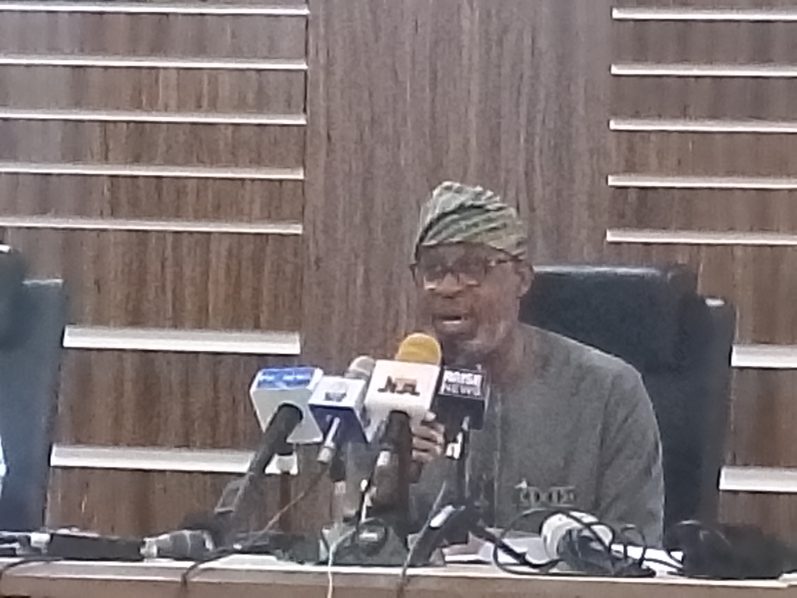–— Set 6 Mineral Processing Centers
— Incorporates NMC
— Form Mines Task Force/Mines Police
The federal government has issued a 30-grace period for illegal miners in the country to join artisanal cooperatives as it rolls out robust reforms in the solid mineral sector with aim to improve a
revenue that accrues from the industry.
Minister Solid Mineral Dele Alake gave the ultimatum at the press conference, on Sunday in Abuja where he unveiled far reaching and targeted transformation plans that aligns with the renewed hope agenda of the administration.
Top on the transformation strategy of government he said is the birth of a Solid Mineral Corporation, as government moves to create 6 Mineral Processing Centers geared at value-addition to minerals extracted across the country.
The Corporation when on stream is expected to enter into joint venture mining agreements with multinationals to scale up production and processing of priority minerals, namely gold, limestone,Coal, Bitumen, Lead, Iron-ore and Baryte.
The minister who commended his predecessors for creating the solid mineral roadmap which currently drives development in the sector however stressed that more geoscientific data on the quantity and location of the identified priority minerals is needed to drive investment in the sector.
On the security concerns and activities of bandits in the mining environment, the minister said that government has approved the creation of Mines Surveillance TaskForce and Mines Police to secure investment in the sector.
While the men and materials for the operation of the outfit would be drawn from the security agencies, Alake said the Mines Police will be domiciled in the ministry.
Alake decried the steady decline in the contribution of solid mineral sector to the economy, falling below 2% compare to what prevails during the colonial era when solid mineral export earned 4.5%
“A significant and interesting fact is that the solid minerals sector that was exploited by the colonial government for export contributed 4.5 percent to Nigeria’s Gross Domestic Product in the ’60s, and 5.6 percent by 1980 accounted for less than 2 percent of Nigeria’s GDP last year.
To demonstrate the gravity, compare this performance to the records of less-endowed countries such as Senegal (20%), Mauritania (24%), and Namibia (50%).
He wondered how the country sunk that low even with more mineral discoveries and vast reserves, including gold, manganese, bitumen, lithium, iron ore, lead, zinc, limestone, uranium, columbite, barite, kaolin, gemstones, coal, topaz, copper in massive proportions.
“At the last count, our estimated reserves include Gold (1 million ounces); Limestone (568 metric tonnes), Lead/Zinc, (Baryte (15 million metric tonnes), Bitumen (N1.1 billion barrels), Iron Ore (3 billion Metric Tonnes) and Coal, (N396 million). How did a sector with over 2 million operators, including over 633 small-scale companies and 251 500 registered miners, struggle to give the economy capital and human development?
He traced the challenges to among other things to ” inefficient geo-data, weak implementation and enforcement, poor environmental, safety, and health policies, fragility and conflict, unregulated artisanal mining, low technical capacity, lack of access to financing, weak inter-governmental and inter-agency co-ordination and weak federal/state relations over mining land as the severe barriers to the development of the sector.”
He said the presidential mandate given him revamp the sector will borrow much from both success and failures seen in the petroleum industry.
“We have been mandated to improve on the formulation and regulation guiding prospecting, quarrying, and mining; improve data gathering; monitor and organize more efficiently the sale and consumption of minerals and increase revenue acruable to the Federal Government from the issuance of permits, licenses, leases and the collection of rents, fees, and royalties.”
Much as minerals deposit is the exclusive control federal government has however assured that the ministry will collaborate with State government and host communities to ensure peace and harmony.
“Whereas the Mining Act recognizes minerals under the ground as the exclusive property of the Federal Government, it also elaborates the need to engage communities whose hitherto peaceful and orderly environment may be disrupted by the investor about to activate a mining license. It is in the interest of peace and order not to arrogate reckless appropriation of communal resources in the guise of executing a license.
“Therefore, while the Ministry will continue to review the standard operating procedures for engaging communities within mining licences, communities are hereby encouraged to form committees which can address the concerns of their members on compensation before exploration, employment during exploration, quarrying, and mining and sustainable community socially responsible programmes during and after rehabilitation of mined sites. Officials of the Ministry have been mandated to prioritize this and facilitate the appropriate appropriation to maintain peace and harmony in the communities” he said.












